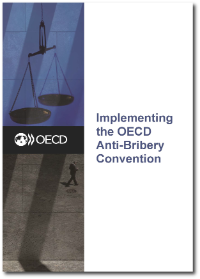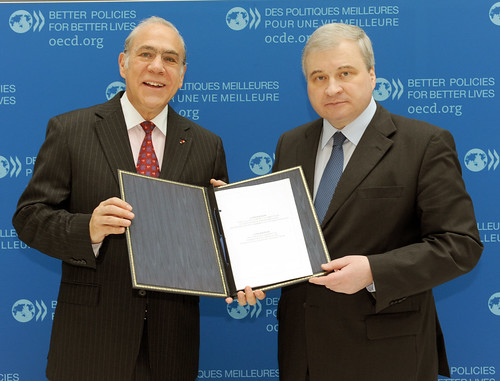Russian Federation
Russia - OECD Anti-Bribery Convention
|
Monitoring and evaluation
|
Russia's accession17 April 2012 17 February 2012 |
|
|
Monitoring and peer review history
October 2021 Phase 3 monitoring evaluation suspended until Russian Federation implements three high-priority recommendations from Phase 2 October 2018 Additional follow-up to Phase 2 report March 2018 Additional follow-up to Phase 2 report 2016 Follow-up to Phase 2 report 2013 Phase 2 report 2012 Phase 1 report
News releases
2019 Russia is ready for its Phase 3 evaluation once it fulfills high-priority recommendation 2019 Russia must urgently step up fight against foreign bribery 2012 Russia joins OECD Anti-Bribery Convention 2011 OECD invites Russia to join Anti-Bribery Convention 2011 OECD welcomes Russia introducing law to make foreign bribery a crime
|
The OECD Anti-Bribery ConventionThe OECD Anti-Bribery Convention establishes standards to criminalise bribery of foreign public officials in international business transactions. Full text and related documents
OECD Working Group on BriberyThe OECD Working Group on Bribery in International Business Transactions is responsible for monitoring the implementation and enforcement of the OECD Anti-Bribery Convention, the 2021 Recommendation and related instruments. The Working Group is made up of representatives from the States Parties to the Convention and meets regularly. Learn more about the Working Group
Monitoring and evaluationMonitoring of implementation and enforcement of the OECD Anti-Bribery Convention takes places in successive phases through a rigorous peer-review monitoring system. |
|
17/02/2012 - Russia today took a major step toward upholding international anti-bribery standards by depositing its instrument of accession to the OECD Convention at a ceremony at the OECD in Paris. OECD Secretary-General Angel Gurría received Russia’s instrument of accession from First Deputy Minister of Foreign Affairs Denisov and First Deputy Minister of Justice Fedorov. Russia became the 39th Party to the OECD Anti-Bribery Convention on 17 April 2012, 60 days after the ceremony.
25/05/2011 - On the occasion of the 50th Anniversary Ministerial Meeting, the OECD invited the Russian Federation to join the OECD’s Working Group on Bribery and to accede to the OECD’s Anti-Bribery Convention. Secretary-General Angel Gurría signed an exchange of letters with First Deputy Minister of Foreign Affairs, Andrey Denisov, and Russia’s Minister for Economic Development, Elvira Nabiullina, at a ceremony with US Secretary of State Hillary Rodham Clinton during the OECD Ministerial Council Meeting. |
Andrey Denisov, First Deputy Foreign Minister of the Russian Federation, explains what the OECD's Anti-Bribery Convention means for Russia | also available in Russian Andrey Denisov, First Deputy Foreign Minister of the Russian Federation, discusses anti-corruption and Russia's accession to the OECD |
Related Documents


